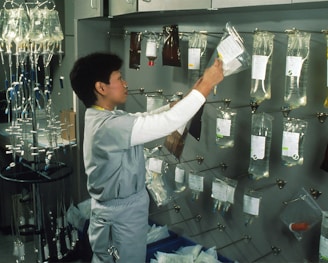

Online Stress Management for Caregivers: How Telemedicine, Suboxone, and Virtual Clinics Support Mental Health
Caregiving is a selfless role, often filled with emotional highs and lows. Whether it’s looking after aging parents, a chronically ill spouse, or a child with special needs, caregivers carry immense physical, emotional, and psychological burdens. Over time, this constant stress can lead to burnout, anxiety, and depression. Fortunately, online stress management for caregivers is becoming more accessible through telehealth clinics, telemedicine services, and digital therapy. In this article, we’ll explore how solutions like online Suboxone treatment and virtual mental health care are transforming caregiver support.
The Growing Need for Caregiver Mental Health Services
According to the Family Caregiver Alliance, over 53 million Americans provide unpaid care to family members or loved ones. These caregivers often neglect their own physical and emotional health in the process. Caregiver stress can manifest as:
Chronic fatigue
Emotional exhaustion
Anxiety or depression
Substance use or dependency
Poor sleep and physical ailments
This emotional toll can push some caregivers to unhealthy coping mechanisms, including substance misuse. That’s where online Suboxone treatment and virtual therapy play critical roles in breaking the cycle and supporting mental wellness.
Understanding Caregiver Burnout and Depression
Caregiver burnout is a state of emotional, mental, and physical exhaustion. Left untreated, it can quickly evolve into clinical depression. Some caregivers feel trapped, isolated, or guilty about asking for help. These emotions may lead to substance misuse as a form of escapism, creating a dual challenge: managing stress and potentially recovering from addiction.
Key signs of caregiver depression include:
Persistent sadness or hopelessness
Withdrawal from social activities
Loss of interest in hobbies
Appetite and sleep disturbances
Thoughts of self-harm or escape
For caregivers experiencing these symptoms, online stress management programs via telemedicine offer both convenience and privacy — two vital features for those juggling demanding caregiving schedules.
How Telemedicine Helps in Stress Management
Telemedicine provides remote access to medical professionals, therapists, and addiction specialists. This technology is especially helpful for caregivers who may not have the time or flexibility to attend in-person appointments.
Benefits of telemedicine for caregivers include:
Flexible scheduling: Appointments available outside regular business hours
No travel required: Ideal for those homebound due to caregiving responsibilities
Privacy and comfort: Access care discreetly from home
Access to specialized care: See licensed psychiatrists or Suboxone doctors without geographical limits
Through virtual platforms, caregivers can now receive therapy, medication management, and even Suboxone prescriptions to manage co-occurring opioid dependence and stress-related mental health issues.
Online Suboxone Treatment: Addressing Addiction in Caregivers
When caregivers turn to opioids to manage pain or emotional distress, addiction can quickly develop. Suboxone (buprenorphine/naloxone) is an FDA-approved medication for opioid use disorder that reduces cravings and withdrawal symptoms.
Online Suboxone treatment is now offered by many telehealth clinics, making it easier for caregivers to begin recovery without interrupting their caregiving duties. These programs often include:
Virtual assessments and prescriptions
Ongoing telepsychiatry support
Counseling and behavioral therapy
Medication management
Secure messaging with providers
With telehealth-based Suboxone programs, caregivers can seek recovery while still maintaining their responsibilities, creating a practical path to healing.
Telehealth Clinics: The Backbone of Virtual Care for Caregivers
Telehealth clinics now offer a wide range of mental health services tailored to caregivers. These clinics provide multidisciplinary care teams, including therapists, addiction specialists, and primary care providers.
Services offered may include:
Cognitive Behavioral Therapy (CBT)
Mindfulness and relaxation training
Stress resilience coaching
Suboxone or other MAT (Medication-Assisted Treatment)
Psychiatric evaluations and medication
Caregivers can book appointments, attend sessions, and access support tools through a user-friendly portal. These online clinics eliminate common barriers like transportation, waitlists, and stigma.
Virtual Tools for Stress Management: Apps and Online Therapy
In addition to telehealth clinics, various digital tools support online stress management for caregivers:
1. Mental Health Apps
Apps like Calm, Headspace, and Sanvello offer guided meditations, breathing exercises, and mood tracking tools to help caregivers manage anxiety and tension on the go.
2. Online Therapy Platforms
Services like BetterHelp and Talkspace connect caregivers with licensed therapists for video, text, or audio-based therapy. These platforms are ideal for caregivers needing emotional support but lacking time for in-person visits.
3. Virtual Support Groups
Peer support is crucial. Many online communities such as Caregiver Action Network or Daily Strength provide forums and virtual meetups where caregivers can share experiences and coping strategies.
These platforms complement medical treatment and encourage caregivers to take small, meaningful steps toward better emotional health.
Integrating Suboxone Treatment With Depression Therapy
For caregivers battling both opioid addiction and depression, an integrated care model is critical. Telemedicine enables dual-diagnosis treatment, where Suboxone is prescribed alongside mental health therapy.
Integrated care may include:
Weekly or bi-weekly therapy sessions
Ongoing Suboxone monitoring
Access to crisis support
Care coordination among providers
Medication adjustments as needed
Caregivers no longer have to suffer in silence or delay treatment due to logistics. With virtual care, help is just a click away.
Creating a Self-Care Routine With Online Support
Online stress management for caregivers should also include daily wellness routines. With guidance from virtual care teams, caregivers can implement:
10-minute daily mindfulness or meditation
Weekly virtual therapy check-ins
Journaling and gratitude practices
Physical activity, even simple walks
Scheduled self-care breaks
These routines, when reinforced by online counseling or a telehealth provider, can gradually restore balance and emotional stability.
Why Caregivers Shouldn’t Wait to Seek Help
Waiting until burnout becomes a crisis can have serious consequences. Caregivers are more prone to depression, cardiovascular disease, and substance use disorders than the general population. Thankfully, modern telemedicine platforms make help more accessible than ever.
Whether it’s depression, anxiety, or opioid dependence, caregivers have options:
Online Suboxone treatment for safe, supervised recovery
Telehealth clinic appointments for consistent care
Mental health apps and platforms for daily support
Virtual support groups to combat isolation
By taking advantage of online stress management tools, caregivers can regain control over their mental health and become more effective — and emotionally balanced — in their caregiving roles.
Conclusion: Empowering Caregivers Through Telehealth and Suboxone Treatment
The modern caregiver no longer has to navigate mental health challenges alone. With online resources like Suboxone treatment, telehealth clinics, and virtual therapy, stress management is not only possible — it’s practical. These digital tools ensure that caregivers receive the care they need while continuing to care for others.
Online stress management for caregivers isn’t just about convenience — it’s about survival. As healthcare continues to evolve, telemedicine will play an increasingly vital role in helping caregivers stay healthy, resilient, and supported.
